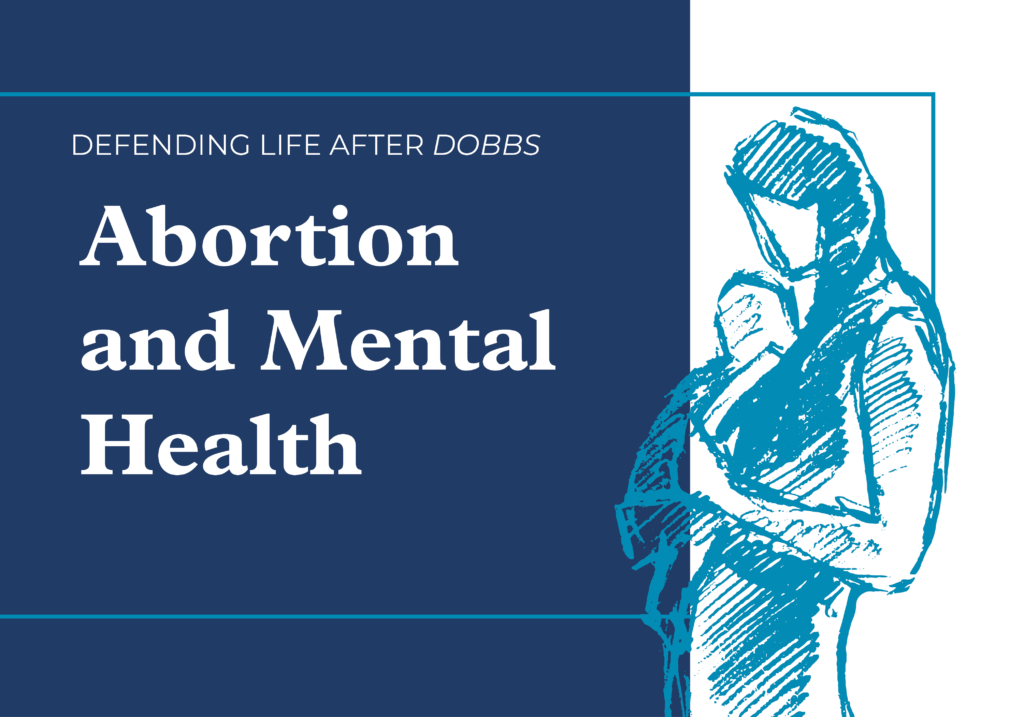
Published February 12, 2024
Abortion supporters often claim that abortion is necessary to address the mental-health issues that women may experience during or after pregnancy. In fact, this claim is specious and unsubstantiated, based not on empirical evidence but on speculation. Those who make this argument ignore the vast research literature on the mental-health consequences of abortion and instead attempt to ground their argument in the unsupported notion that abortion can and will reduce mental-health risks.
There is no empirical evidence that abortion improves mental-health outcomes or substantively reduces the risks of mental-health problems associated with pregnancy or the postpartum period, despite multiple studies looking to establish such a link. On the contrary, the preponderance of evidence suggests that abortion worsens mental-health outcomes across a range of psychiatric disorders. At the very least—and this remains undisputed by researchers—abortion does not improve mental health outcomes. The only debated question among researchers in this regard relates to the degree of mental-health risks from abortion and the severity or frequency of those risks.
Some abortion supporters argue that when the stress and anxiety associated with pregnancy triggers or amplifies a mental-health condition, removing that supposedly exacerbating condition—i.e., performing an abortion—will mitigate the risk. But this claim is nothing more than a hypothesis; it is not a conclusion of scientific research. There is no evidence to support the notion that abortion mitigates mental health risks, much less that it is more effective than medication and/or psychotherapy. Both of these claims are entirely hypothetical, and indeed, they present a hypothesis which is strongly contradicted by the weight of medical evidence on abortion and mental health. With good psychiatric care and follow-up, women with a mental illness can be safely managed and stabilized during pregnancy.
One of the major challenges in researching the effects of abortion, including mental-health outcomes, is that abortion tends to be underreported. Typically, respondents will report under half, and as few as 30 percent, of the number of abortions expected based on age-adjusted national data on abortion rates. What’s more, several studies have found that women who refuse to participate in follow-up studies are also those who are more likely to have experienced negative psychological reactions to their abortions. This results in a sampling selection bias in research on abortion and mental health, skewing results toward finding lower rates of mental-health problems than is actually the case.
Nevertheless, an unbiased appraisal of the research literature still indicates that a significant number of women do suffer negative mental-health consequences as a result of abortion. As the U.S. Supreme Court acknowledged in Gonzales v. Carhart, “It seems unexceptionable to conclude some women come to regret their choice to abort the infant life they once created and sustained. Severe depression and loss of esteem can follow.”[i]
Evidence from clinical and social science research supports this conclusion. While there remains disagreement among researchers regarding the frequency and severity of, and risk factors for, mental health problems following abortion, there are substantial areas of concurrence among the major studies: (1) abortion is consistently associated with elevated rates of mental health problems compared to women without a history of abortion; (2) the abortion experience contributes to mental health problems for at least some women; (3) there are risk factors, such as pre-existing mental illness, that identify women at elevated risk of mental health problems after an abortion; (4) it is challenging to conduct research in this field in a manner that can definitively identify the extent to which any mental illnesses following abortion can be causally attributed to abortion itself, however, available research is strongly suggestive of a causal link between abortion and poor mental health outcomes; and (5) most important, no available research demonstrates that abortion improves mental health outcomes for pregnant women.
Some women who obtain abortions subsequently suffer psychologically complex and distressing consequences, and in many of these cases, psychological harms are pronounced and measurable. A 2011 meta-analysis by Priscilla Coleman quantitatively synthesized research published between 1995 and 2009 on abortion and subsequent mental-health outcomes.[ii] The results showed that women with an abortion history experienced an 81 percent increased risk for mental-health problems of various kinds compared to women who had not had an abortion. The study found statistically significant effects for all five areas measured: anxiety disorders increased by 34 percent, depression increased by 37 percent, alcohol abuse increased by 110 percent, marijuana abuse increased by 220 percent, and suicidal behaviors increased by 155 percent.
In addition to comparing women who had an abortion with women who did not, it is also instructive to compare women who had an abortion to women who had an unintended pregnancy but chose to carry the pregnancy to term. In Coleman’s meta-analysis, when compared to women with unintended pregnancy brought to term, women who had an abortion still had a 55 percent increased risk of mental-health problems. Women in the unintended pregnancy carried to term group were closer to the results for the no abortion group than they were to the abortion group.
Prior to Coleman’s study there was one similar meta-analysis, done by Thorp and colleagues in 2003, which found that abortion was associated with increased depression and could lead to self-harm behaviors. The authors concluded: “Induced abortion increased the risks for both a subsequent preterm delivery and mood disorders substantial enough to provoke attempts of self-harm. Preterm delivery and depression are important conditions in women’s health and avoidance of induced abortion has potential as a strategy to reduce their prevalence.”[iii]
Three well-designed studies using medical records have examined the connection between abortion and the risk for subsequent suicide. A Finnish record study showed that women who had an abortion were three times more likely to commit suicide within one year of the abortion than women in the general population, and more than six times more likely to commit suicide than women who carried their pregnancies to term. A similar study done in Denmark showed that women who had abortions were at higher risk for admission to psychiatric hospitals within three months than women who carried their pregnancies to term. Another study of abortion and suicide studied Medicaid claims for 173,000 women in California and found that women who had an abortion were 154 percent more likely to commit suicide compared to women who delivered.
Abortion advocates also frequently cite the “Turnaway” study—a small study of 1,000 women, funded by private foundations with a long history of abortion advocacy—to argue that abortion is not associated with poor mental health outcomes. However, the Turnaway study has serious methodological weaknesses which should be taken into account when interpreting its findings. We should note especially the low rates of initial enrollment and high rates of dropout in this study: despite a financial inducement (study participants were offered $50), over two-thirds (69%) of the women approached at the abortion clinics refused to participate in at least one interview, and half of those who agreed to enroll in the study later dropped out. (For context, generally a dropout rate of less than 5% from a study leads to little bias, while more than 20% poses serious threats to validity—though even small proportions of patients lost to follow-up can cause significant bias.[iv])
This introduces a significant selection bias into the study sample, since we know that women who are ambivalent or struggling with the abortion decision are less likely to enroll in research studies on abortion. The selection bias may have been further amplified by the recruitment methods. According to the portion of study protocol that the researchers published: “It is up to the clinic staff at each recruitment site to keep track of when to recruit abortion clients to match to the turnaways (women who sought an abortion but were over the state’s gestational age limit) recruited.” This enrollment method allowed clinic staff to exercise considerable leeway in deciding which women to invite to participate in the study. The lack of random sampling could easily exclude women whom staff anticipated would have difficulties during or following their abortion. Given the nonrandom sampling, low rates of enrollment, and high dropout rates, the Turnaway study researchers did not actually have reliable information about what most women later experience and believe regarding their abortion decisions. For all its limitations, the Turnaway study did not find that access to abortion improved mental health outcomes for pregnant women.
[i] Citing brief for Sandra Cano et al. as Amici Curiae in No. 05–380, pp. 22–24 550 U.S. 124, 159 (2007).
[ii] Priscilla K. Coleman, “Abortion and Mental Health: Quantitative Synthesis and Analysis of Research Published 1995–2009,” British Journal of Psychiatry 199, no. 3 (2011).
[iii] J. M. Thorp, Jr., K. E. Hartmann, and E. Shadigian, “Long-Term Physical and Psychological Health Consequences of Induced Abortion: Review of the Evidence,” Obstet Gynecol Surv 58, no. 1 (2003).
[iv] Catalogue of Bias Collaboration, Bankhead C, Aronson JK, Nunan D. Attrition bias. In: Catalogue Of Bias 2017. https://catalogofbias.org/biases/attrition-bias/. Cf. also Schulz KF, Grimes DA. Sample size slippages in randomised trials: exclusions and the lost and wayward. Lancet. 2002 Mar 2;359(9308):781-5.












